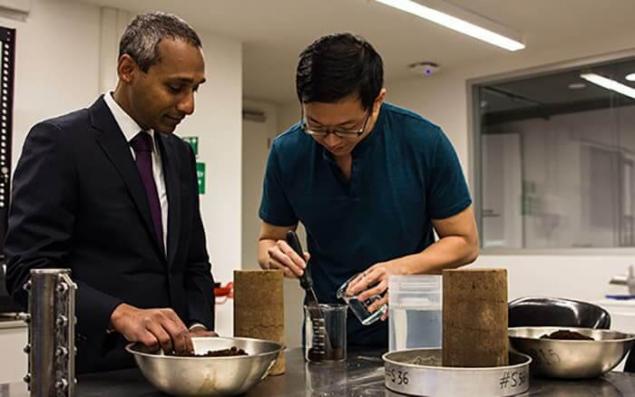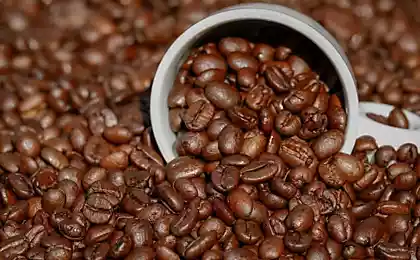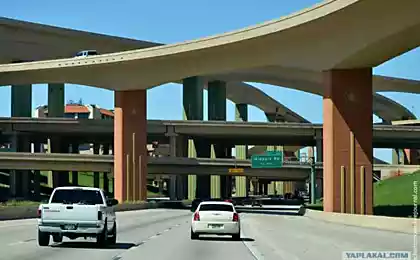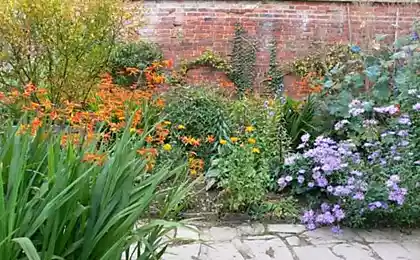826
Scientists use coffee grounds for the construction of roads
Melbourne really love their coffee, and one day this drink will not only help to wake up, but also to become part of urban roads. Researchers at Swinburne University of Technology, coffee grounds collected from all over the campus and used it as part of the mix for a more sustainable road construction material.

The research led by Professor Arul Arulradzhah (Arul Arulrajah), who heads the Center of the University of sustainable infrastructure. The subject of his work was that, like other recycled materials, such as broken bricks, glass and concrete can be reused in a more efficient road construction.
"I saw the baristas discarded coffee grounds, and thought, why not consider it as a technical material?" He says.
So Arulradzhah and his research team collected the coffee grounds from the coffee shop around the university and was drying it in an oven for five days at a temperature of 50 ° C (122 ° F). They filtered coffee to remove any lumps and then mix it with the waste product from the production of steel, called slag, at a ratio of seven to three parts.

After adding the liquid alkaline solution, to connect together all the components, the command then compacted mixture into cylindrical blocks. Further tests showed that the blocks are strong enough to use them as a soil material, which is a road surface.
An attempt to solve the environmental problems associated with exposure to the production of coffee, gave rise to a number of creative uses of coffee grounds, which annually produces millions of tons. As such, the production of biofuels, carbon capture SO2i even production of denim, which we described earlier.
Swinburne University researchers say that if their approach to expand, and give them free rein to municipal waste coffee, after a while they could pave the way to the green, in the literal and figurative sense.
"On the average, with a cafe, we get about 150 kg (330 pounds) of coffee grounds per week," said the professor. "According to our estimates, the coffee grounds from Melbourne cafes could be used to build five kilometers (3 miles 1) of roads per year. This will reduce the amount of waste in landfills and demand for quarry stone materials. "

The research led by Professor Arul Arulradzhah (Arul Arulrajah), who heads the Center of the University of sustainable infrastructure. The subject of his work was that, like other recycled materials, such as broken bricks, glass and concrete can be reused in a more efficient road construction.
"I saw the baristas discarded coffee grounds, and thought, why not consider it as a technical material?" He says.
So Arulradzhah and his research team collected the coffee grounds from the coffee shop around the university and was drying it in an oven for five days at a temperature of 50 ° C (122 ° F). They filtered coffee to remove any lumps and then mix it with the waste product from the production of steel, called slag, at a ratio of seven to three parts.

After adding the liquid alkaline solution, to connect together all the components, the command then compacted mixture into cylindrical blocks. Further tests showed that the blocks are strong enough to use them as a soil material, which is a road surface.
An attempt to solve the environmental problems associated with exposure to the production of coffee, gave rise to a number of creative uses of coffee grounds, which annually produces millions of tons. As such, the production of biofuels, carbon capture SO2i even production of denim, which we described earlier.
Swinburne University researchers say that if their approach to expand, and give them free rein to municipal waste coffee, after a while they could pave the way to the green, in the literal and figurative sense.
"On the average, with a cafe, we get about 150 kg (330 pounds) of coffee grounds per week," said the professor. "According to our estimates, the coffee grounds from Melbourne cafes could be used to build five kilometers (3 miles 1) of roads per year. This will reduce the amount of waste in landfills and demand for quarry stone materials. "























